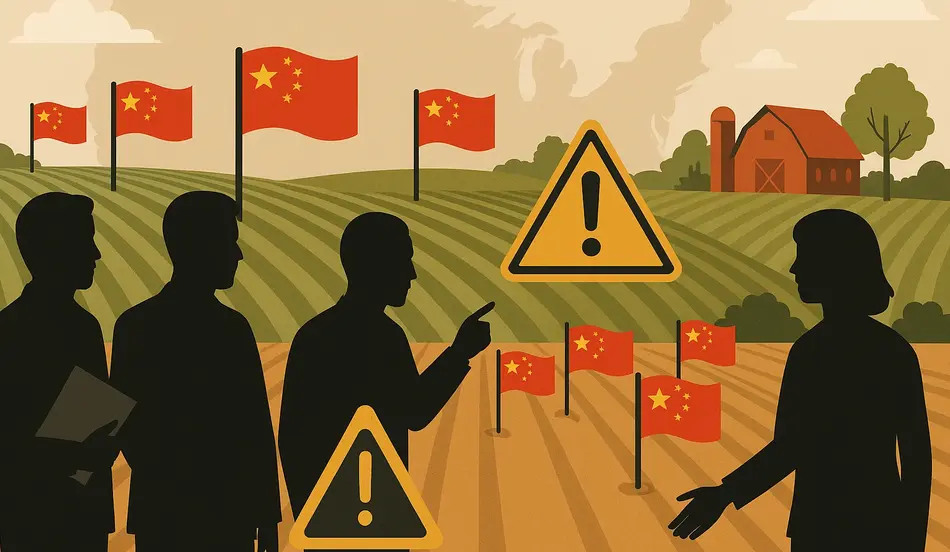The Trump administration has announced plans to ban Chinese-linked buyers from purchasing US farmland, citing national security concerns despite the relatively small amount of land currently under Chinese ownership. This decisive move raises important questions about foreign investment in American agriculture, food security, and the protection of sensitive military installations.
The Growing Threat of Foreign Farmland Ownership
While Chinese investors currently own approximately 265,000 acres of US farmland—less than 1% of all American agricultural land—government officials argue that even limited foreign ownership near critical infrastructure poses significant national security risks. Agriculture Secretary Brooke Rollins emphasized this concern, stating: “American agriculture is not just about feeding our families, but about protecting our nation and standing up to foreign adversaries who are buying our farmland, stealing our research, and creating dangerous vulnerabilities in the very systems that sustain us.”
The ban would extend beyond China to include other nations deemed foreign adversaries, marking a significant shift in how the United States manages foreign investment in its agricultural sector. This policy reflects growing bipartisan concern about protecting America’s food supply chain and strategic assets from potential foreign interference.
Current State of Chinese Agricultural Investment
According to data from the US Department of Agriculture, Chinese ownership of American farmland represents just a fraction of the total foreign-owned agricultural land in the United States:
- Chinese investors own approximately 265,000 acres
- This represents less than 0.01% of all US farmland
- Chinese agricultural investment has actually decreased by nearly one-third over the past 4-5 years
- About one-third of Chinese-owned farmland belongs to a single company: Smithfield Foods
Despite these relatively small numbers, security experts and policymakers have expressed increasing concern about the strategic implications of even limited foreign ownership in certain locations.
National Security Concerns Drive Policy Change
The primary security concern driving this policy is not the amount of land owned by Chinese investors but rather the proximity of certain parcels to sensitive military installations. National security experts have identified several potential threats associated with foreign ownership of land near critical infrastructure.
Military Base Proximity Concerns
Security officials highlight that land ownership near military facilities could potentially enable:
- Surveillance of troop movements and military activities
- Intelligence gathering on military capabilities and operations
- Monitoring of communications and technology testing
- Establishment of listening posts or other surveillance equipment
The catalyst for heightened concern was a specific case in North Dakota, where a Chinese company purchased land near an Air Force base. This acquisition raised alarms about the potential for foreign entities to conduct espionage or surveillance operations from strategically located properties.
According to research from the RAND Corporation, proximity to military installations represents one of the most significant security vulnerabilities associated with foreign land ownership, as it could potentially compromise operational security and intelligence.
Food Security Considerations
Beyond military concerns, some policymakers have raised theoretical concerns about food security, suggesting that foreign control of agricultural assets could potentially be leveraged during international conflicts or crises:
- Disruption of food supply chains during geopolitical tensions
- Potential for sabotage of agricultural production
- Access to advanced agricultural research and technology
- Control over critical food production infrastructure
However, experts note that the current level of Chinese ownership is far too small to meaningfully impact America’s food security. The United States maintains robust domestic agricultural production capacity that would be difficult to significantly disrupt through limited foreign land holdings.
Economic Impact on American Agriculture
The proposed ban raises questions about potential economic impacts on the US agricultural sector, though analysts suggest these effects would likely be minimal given the small percentage of land currently under Chinese ownership.
Limited Market Effects Expected
Economic analysts anticipate minimal market disruption from the proposed ban for several reasons:
- Chinese investment represents a tiny fraction of total US farmland
- Chinese ownership has already been declining in recent years
- Most Chinese-owned operations primarily serve US markets
- The ban would affect future purchases rather than existing holdings
One notable exception is Smithfield Foods, which employs approximately 43,000 American workers. Any policy affecting this company’s operations could potentially impact these jobs and associated economic activity in certain communities.
According to agricultural economists at the University of Missouri, foreign investment in US farmland has historically had minimal impact on overall agricultural land prices or production capacity at the national level, though effects can be more pronounced in specific local markets with concentrated foreign ownership.
Bipartisan Support for Restricting Foreign Land Purchases
The move to restrict Chinese farmland purchases enjoys broad bipartisan support, reflecting the increasingly hawkish stance toward China across the American political spectrum.
Political Consensus on China Policy
Several factors contribute to this rare area of political agreement:
- Growing concerns about Chinese economic and military expansion
- Bipartisan recognition of national security implications
- Public anxiety about foreign ownership of American assets
- Electoral advantages of taking strong positions on China
Both Republican and Democratic lawmakers have proposed various measures to restrict foreign ownership of US farmland in recent years, with particular focus on buyers from China, Russia, Iran, and North Korea.
The Committee on Foreign Investment in the United States (CFIUS) has increasingly scrutinized agricultural land purchases near sensitive sites, reflecting this bipartisan concern about potential security vulnerabilities.
Practical Reality vs. Theoretical Concerns
Despite the strong rhetoric surrounding Chinese land ownership, security experts acknowledge that the practical threat level may be lower than public perception suggests.
Limited Evidence of Actual Threats
Several factors suggest the security risks may be overstated:
- No documented cases of Chinese agents using farmland for espionage
- Traditional espionage methods (like tourists taking photos) remain more common
- Most Chinese agricultural investments are legitimate business ventures
- Existing security measures already monitor sensitive areas around military bases
Intelligence officials note that while foreign ownership near military installations warrants vigilance, most actual espionage cases involve more direct methods rather than agricultural land purchases.
Smithfield Foods: A Case Study
The case of Smithfield Foods illustrates the complexity of the issue:
- Chinese-owned but operates primarily in the US market
- Employs tens of thousands of American workers
- Integrated into domestic supply chains
- Subject to existing US regulations and oversight
This example demonstrates how foreign-owned agricultural businesses often become deeply embedded in American communities and supply chains, complicating simplistic security narratives.
State-Level Responses to Foreign Land Ownership
While the federal government considers nationwide restrictions, many states have already implemented their own limits on foreign agricultural land ownership.
Existing State Restrictions
Currently, numerous states have enacted various restrictions:
- Some states prohibit or limit foreign ownership of agricultural land
- Others require special reporting and disclosure requirements
- Several focus specifically on ownership by entities from “foreign adversaries”
- Restrictions vary widely in scope and enforcement mechanisms
According to the National Agricultural Law Center, approximately half of US states have some form of restriction on foreign ownership of agricultural land, with approaches ranging from outright prohibitions to acreage limitations or special review processes.
Hiring?
Post agricultural and security jobs on WhatJobs – Find qualified candidates who are ready to protect and sustain your operations.
Post a Job for FreeBalancing Security and Investment
The challenge for policymakers is striking the appropriate balance between legitimate national security concerns and maintaining an open investment environment that benefits the agricultural sector.
Potential Policy Approaches
Security experts and agricultural economists suggest several balanced approaches:
- Targeted restrictions based on proximity to sensitive installations
- Enhanced review processes rather than blanket bans
- Maintaining existing investments while scrutinizing new purchases
- Focusing on specific security risks rather than country of origin
- Implementing more robust monitoring and reporting requirements
These nuanced approaches could address genuine security concerns while avoiding unnecessary economic disruption or diplomatic tensions.
Search for national security analyst positions on WhatJobs
FAQ About Foreign Farmland Ownership
What percentage of US farmland is owned by Chinese investors?
Chinese investors own approximately 265,000 acres of US farmland, which represents less than 0.01% of all American agricultural land. This is a very small fraction compared to the total amount of foreign-owned farmland in the United States. According to USDA data, the majority of foreign-owned US farmland belongs to investors from Canada, European countries, and other allies. The relatively small amount of Chinese ownership has actually decreased by nearly one-third over the past 4-5 years due to various factors, including changes in Chinese regulations regarding overseas investments.
How does foreign farmland ownership affect national security?
Foreign farmland ownership can potentially affect national security when agricultural land is located near sensitive military installations or critical infrastructure. Security experts are primarily concerned about the possibility of surveillance, intelligence gathering, or monitoring of military activities from these properties. The main security concern is not about the amount of land owned but rather its strategic location. For example, land adjacent to Air Force bases, missile facilities, or other defense installations could theoretically provide opportunities for foreign intelligence collection. However, it’s important to note that there have been no documented cases of Chinese agents using farmland ownership specifically for espionage purposes.
Will restricting foreign farmland ownership impact food prices or agricultural jobs?
Restricting foreign farmland ownership is unlikely to significantly impact food prices or the broader agricultural economy due to the small percentage of land currently under foreign ownership. Most economic analyses suggest minimal market disruption would result from the proposed restrictions. However, there could be localized impacts in areas with concentrated foreign investment. For instance, Smithfield Foods, which is Chinese-owned, employs approximately 43,000 American workers. Any policy affecting this company’s operations could potentially impact these jobs and associated economic activity in certain communities. Agricultural economists generally agree that domestic factors like weather, production costs, and domestic policy have far greater influence on food prices than foreign land ownership.
How do other countries regulate foreign ownership of agricultural land?
Many countries around the world have restrictions on foreign ownership of agricultural land, often more stringent than current US policies. Australia requires foreign investors to obtain approval from their Foreign Investment Review Board before purchasing agricultural land. New Zealand restricts foreign purchases of sensitive land, including farmland over certain size thresholds. Canada’s provinces have varying restrictions, with some limiting non-resident ownership to small acreages. European countries like France and Germany have systems requiring special authorization for non-EU citizens to purchase agricultural land. Brazil restricts the amount of rural land that can be owned by foreigners and foreign companies. These international approaches demonstrate that concerns about foreign agricultural land ownership are not unique to the United States, though the specific security concerns and implementation methods vary widely.
The debate over foreign ownership of US farmland highlights the complex intersection of national security, agricultural policy, and international relations. While the actual security threat posed by the current level of Chinese land ownership may be limited, the policy shift reflects broader concerns about protecting America’s strategic assets and maintaining control over critical resources. As the United States continues to navigate its relationship with China and other global competitors, finding the right balance between security vigilance and economic openness remains a critical challenge.




